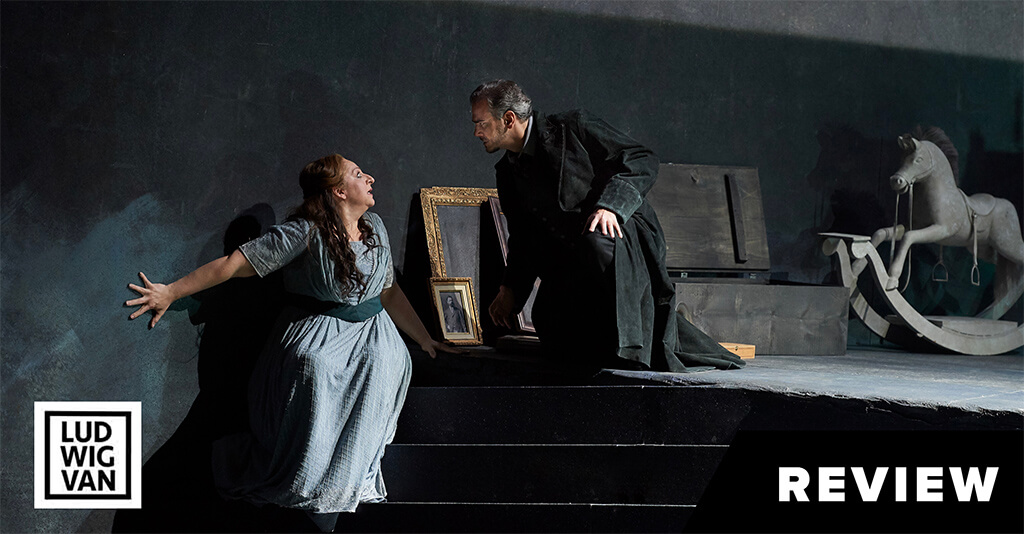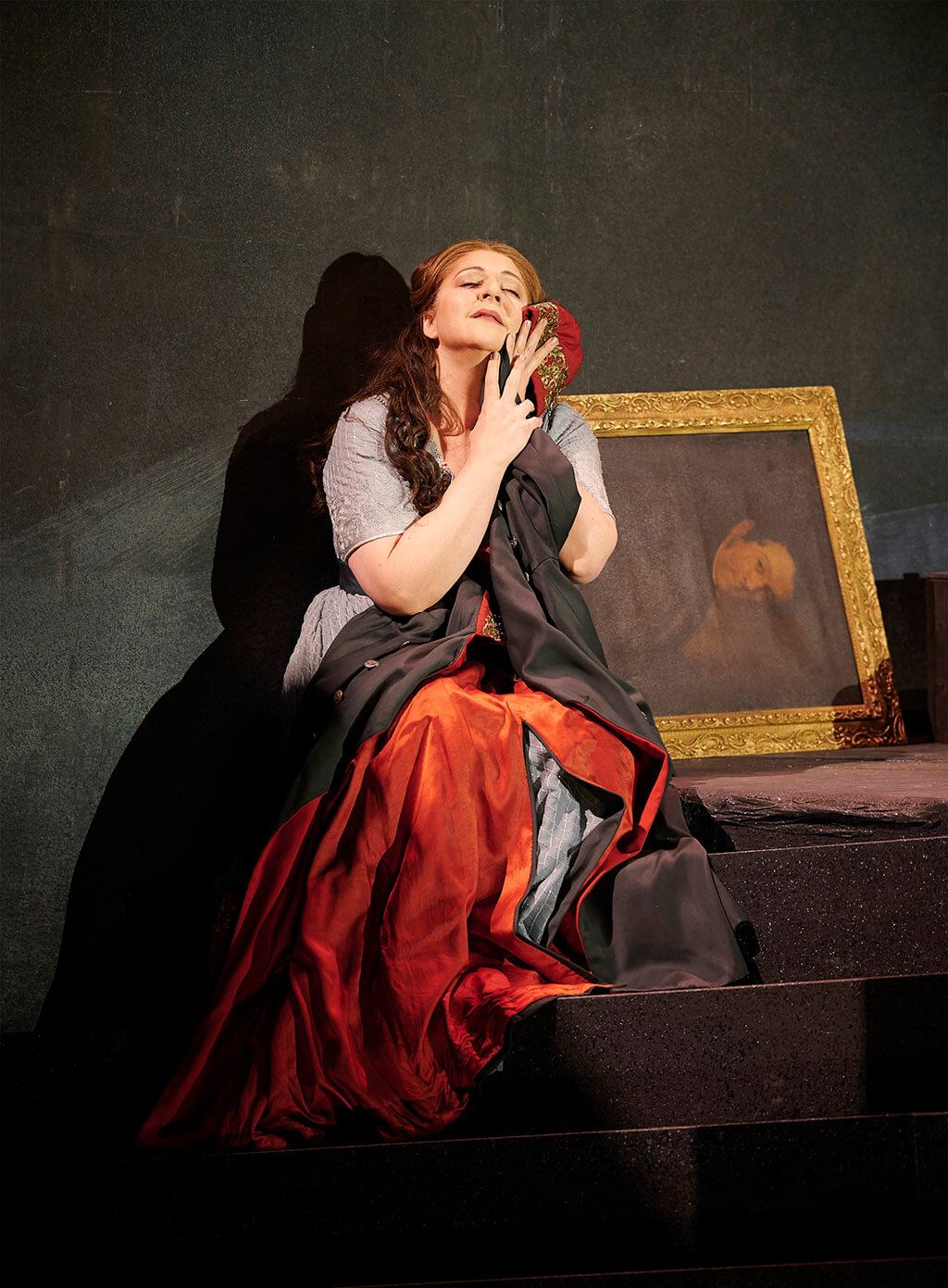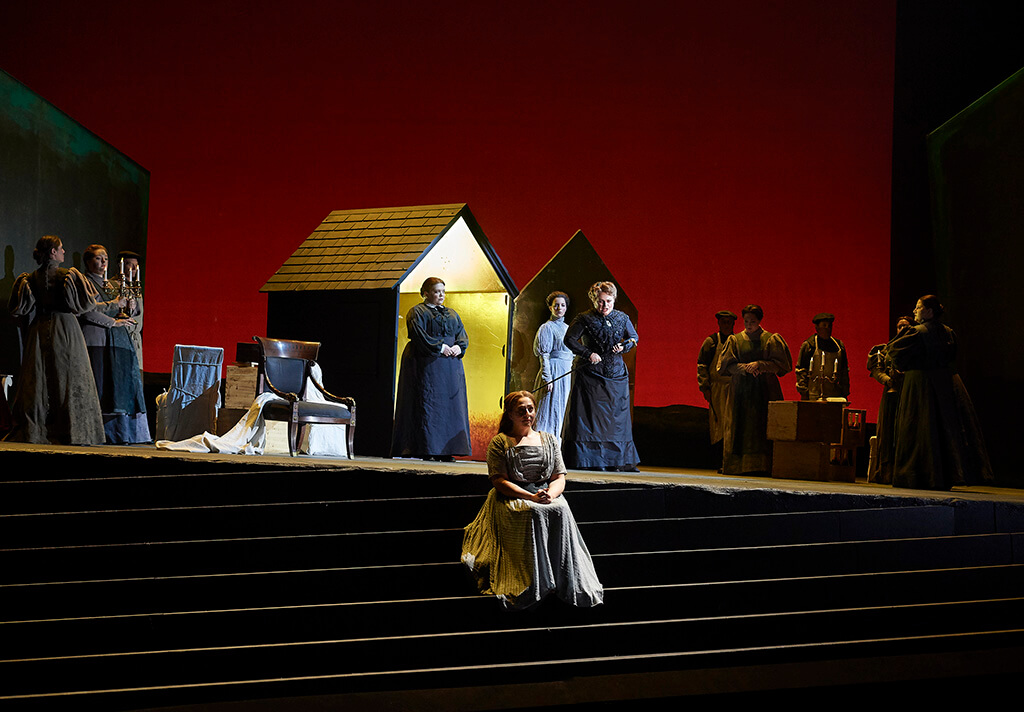
Richard Strauss: Elektra | Christine Goerke, Erin Wall, Susan Bullock, Wilhelm Schwinghammer, Michael Schade, Jill Grove, Simona Genga, Lauren Segal, Tracy Cantin, Lauren Eberwein, Alexandra Loutsion, Simone McIntosh, Lauren Margison, Owen McCausland, Thomas Goerz, Michael Druiett; Canadian Opera Company Orchestra and Chorus, Johannes Debus, conductor; James Robinson, director. Four Seasons Centre, January 26, 2019.
The Canadian Opera Company’s winter season kicked off with a revival of a production of Elektra that premiered in the fall of 1996, in the Hummingbird Centre (Meridian Hall). Last seen in 2007 in the new opera house, the current revival is the third outing for this production. There have been wonderful singers in the title role in the past at the COC, starting with none other than the great Astrid Varnay in 1969. Christine Goerke is a most worthy successor to that storied lineage.
Last evening, as the galvanizing final chord sounded and the audience leapt to its collective feet, showering the singers with cheers, I thought to myself that this piece has got to be the most intense 100 minutes of opera ever composed. A bold statement I know, but in my five decades of live opera experiences, I haven’t encountered anything as gut-wrenching as this Strauss masterpiece, especially when it is as superbly rendered as this.
Based on performances statistics for seasons 2015-18, Elektra ranks 47th in popularity out of a total of 2,500+ works. It received 254 performances worldwide, second only to Salome (336), and more popular than Der Rosenkavalier (238) and Ariadne auf Naxos (198). Composed in the era of Freud, Munch, and Expressionism and Psychoanalysis, this retelling of the Sophocles tale underscores the dark side of human nature in frightening terms.
Premiered in Dresden in 1909, the opera was Strauss’s second success, after Salome. Strauss was certainly pushing the musical boundaries with this piece, with expanded tonalities and moments of near-atonality, especially when called for by the dramatic situation. I am fond of telling people new to this work that they will never hear more beautiful “ugly music” in opera. To be sure, rapturous moments of transcendental beauty abound, as in the Recognition Scene. The musical language of Strauss is what makes this piece endlessly fascinating.

In this retelling of the Sophocles tale, Hofmannsthal the librettist focuses on the individual and the psychological rather than the grandly political. Elektra, the ostracized daughter, is intent on avenging the death of her father, Agamemnon, at the hands of her mother, Klytaemnestra and her lover Aegisth. Orest, the exiled son, returns to kill them both. [Spoiler alert] The story ends with Elektra dropping dead, presumably from happiness — only in opera, right?
This work is dominated by female voices, most of all by Elektra, who is never off the stage in the 100 minutes, making it arguably the most demanding of all dramatic soprano roles, on par with if not surpassing Brünnhilde and Isolde. The COC revival is fortunate to have American soprano Christine Goerke as a magnificent Elektra. I first saw her Elektra five years ago at the Michigan Opera Theatre. Already impressive, now she’s the definitive interpreter, vocally fearless, from gentle piano and pianissimos to penetrating, powerful fortissimos and everything in between. She also acted with abandon. It was a remarkable performance.
A very pleasant surprise was the Chrysothemis of Canadian soprano Erin Wall, who met the challenges of the role beautifully, singing with a vibrant, refulgent top, and her portrayal of the “weak sister” was totally sympathetic. It’s no secret that the soprano has had more than her share of physical health issues the last number of years, and it’s gratifying to see that she has overcome them and is singing so well.
Making a welcome return to the COC was British soprano Susan Bullock, the Elektra in 2007. Vocally, her Klytaemnestra is different from the others I’ve heard. She brings to the role a soprano timbre, unlike the low mezzos and contraltos who regularly inhabit this role — no “truck-driver chest tones” for Ms. Bullock! She impresses not with power and volume but with nuance and dramatic vulnerability. Her paranoia was such that you could cut it with a knife.
This revival marks the debut of German baritone Wilhelm Schwinghammer. He sang with an attractive, warm baritone and brought the requisite gravitas to Orest, albeit with some unsteadiness to his tone. Veteran Canadian tenor Michael Schade shows that he can be an excellent character singer, his Aegisth was dramatically vivid and vocally spot on.

The many supporting roles in this opera were all well taken, either by COC “regulars” or artists making their Company debuts. I was particularly impressed by the excellent contingent of five “maids,” including well-known singer Jill Grove (First Maid) who’s covering Klytaemnestra, and promising artists the likes of Tracy Cantin (Fourth Maid) who was wonderful as Anna Bolena deputizing for Sondra Radvanovsky last season. Another standout was tenor Owen McCausland (Young Servant), a former COC Ensemble member and now sounding a young heroic tenor in the making.
The 1996 production has been modified to make it look less garish colour-wise, and “softened” with the addition of a door to the outhouse, uh, the “palace.” The walls are reminiscent of distressed Rothko paintings, and the laterally raked stage remains a hazard for the performers. That said, the singers gamely negotiated the treacherous sets without mishap. In any case, the set design evokes the proper Expressionist ambience. The chorus got to shine near the end of the opera, and they sounded glorious. But from where? Somewhere at the back of the theatre?
Musically, top honours belonged to the fantastic (augmented to 105 musicians) COC Orchestra under Music Director Johannes Debus. If I may allow myself a personal note — the first time I heard Johannes Debus conducted was in Munich in 2007, in none other than Elektra! I was so blown away that I actually sent him a “fan e-mail,” something that I hadn’t done since my student days. He graciously wrote back to me. I must point out it was before I got any idea that he would be engaged for War and Peace a few months later, due to the untimely passing of Richard Bradshaw.
I think Toronto opera fans are extremely lucky to have him here. On this occasion, his Elektra has grown more nuanced, with greater dynamic contrasts, complete with an impressive kaleidoscope of colours. The sounds coming out of the pit was overwhelming, and in a good way. I admit I am an Elektra junkie. When it is this good, I would consider going back for a later performance, that is in addition to a working rehearsal, a dress rehearsal, and opening night. Strauss, like Wagner, is addictive. This is definitely a highlight of the 2018-19 COC season.
+++
Six more performances of Elektra to February 22 at the Four Seasons Centre. Details, here.



